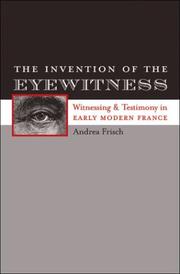| Listing 1 - 10 of 61 | << page >> |
Sort by
|
Book
ISBN: 1433812843 Year: 2013 Publisher: Washington, District of Columbia : American Psychological Association,
Abstract | Keywords | Export | Availability | Bookmark
 Loading...
Loading...Choose an application
- Reference Manager
- EndNote
- RefWorks (Direct export to RefWorks)
Book
ISBN: 1118469569 1118469577 Year: 2015 Publisher: : Wiley,
Abstract | Keywords | Export | Availability | Bookmark
 Loading...
Loading...Choose an application
- Reference Manager
- EndNote
- RefWorks (Direct export to RefWorks)
Book
ISBN: 0309449111 Year: 2016 Publisher: Washington, District of Columbia : National Academies Press,
Abstract | Keywords | Export | Availability | Bookmark
 Loading...
Loading...Choose an application
- Reference Manager
- EndNote
- RefWorks (Direct export to RefWorks)
Book
ISBN: 3830540744 9783830540748 Year: 2018 Publisher: Berlin BWV Berliner Wissenschafts-Verlag
Abstract | Keywords | Export | Availability | Bookmark
 Loading...
Loading...Choose an application
- Reference Manager
- EndNote
- RefWorks (Direct export to RefWorks)
Book
ISBN: 0190230142 1282402889 9786612402883 0199706883 9780199706884 9780195372687 0195372689 Year: 2010 Publisher: Oxford New York Oxford University Press
Abstract | Keywords | Export | Availability | Bookmark
 Loading...
Loading...Choose an application
- Reference Manager
- EndNote
- RefWorks (Direct export to RefWorks)
Forensic mental health assessment (FMHA) has grown into a specialization informed by research and professional guidelines. This series presents up-to-date information on the most important and frequently conducted forms of FMHA. The 19 topical volumes address best approaches to practice for particular types of evaluation in the criminal, civil, and juvenile/family areas. Each volume contains a thorough discussion of the relevant legal and psychological concepts, followed by a step-by-step description of the assessment process from preparing for the evaluation to writing the report and testifyi
Book
ISBN: 0805818650 Year: 1996 Publisher: Mahwah Erlbaum
Abstract | Keywords | Export | Availability | Bookmark
 Loading...
Loading...Choose an application
- Reference Manager
- EndNote
- RefWorks (Direct export to RefWorks)

ISBN: 1469641550 9781469641553 0807892831 9780807892831 Year: 2004 Publisher: Chapel Hill U.N.C. Department of Romance Languages
Abstract | Keywords | Export | Availability | Bookmark
 Loading...
Loading...Choose an application
- Reference Manager
- EndNote
- RefWorks (Direct export to RefWorks)
Evidence --- Eyewitness identification --- Witnesses --- History.
Book
ISBN: 9780199216932 Year: 2008 Publisher: Oxford ; New York : Oxford University Press,
Abstract | Keywords | Export | Availability | Bookmark
 Loading...
Loading...Choose an application
- Reference Manager
- EndNote
- RefWorks (Direct export to RefWorks)
Criminals --- Eyewitness identification. --- Recognition (Psychology). --- Witnesses. --- Identification.
Book
ISBN: 9781479886333 1479886335 9781479851157 1479851159 Year: 2021 Publisher: New York, NY
Abstract | Keywords | Export | Availability | Bookmark
 Loading...
Loading...Choose an application
- Reference Manager
- EndNote
- RefWorks (Direct export to RefWorks)
In 1981, sixteen-year-old Michael Williams was convicted on charges of aggravated rape based on the victim's eyewitness testimony. No other evidence was found linking him to the attack. After nearly twenty-four years, Williams was released after three separate DNA analyses proved his innocence. The victim still maintains that Williams was the culprit. This heartbreaking case is but one example of eyewitness error. In 'Understanding Eyewitness Memory', Sean M. Lane and Kate A. Houston delve into the science of eyewitness memory. They examine a number of important topics, from basic research on perception and memory to the implications of this research on the quality and accuracy of eyewitness evidence.
Memory. --- Recollection (Psychology) --- Eyewitness identification --- Psychological aspects.
Book
ISBN: 9781433812835 1433812835 Year: 2013 Publisher: Washington, DC : American Psychological Association,
Abstract | Keywords | Export | Availability | Bookmark
 Loading...
Loading...Choose an application
- Reference Manager
- EndNote
- RefWorks (Direct export to RefWorks)
| Listing 1 - 10 of 61 | << page >> |
Sort by
|

 Search
Search Feedback
Feedback About UniCat
About UniCat  Help
Help News
News